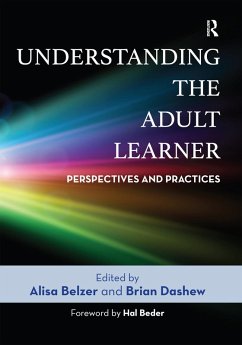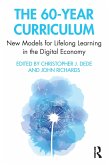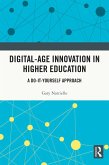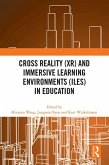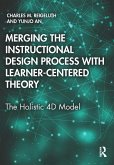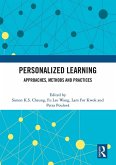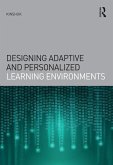Understanding the Adult Learner (eBook, ePUB)
Perspectives and Practices
Redaktion: Belzer, Alisa; Dashew, Brian
41,95 €
41,95 €
inkl. MwSt.
Sofort per Download lieferbar

21 °P sammeln
41,95 €
Als Download kaufen

41,95 €
inkl. MwSt.
Sofort per Download lieferbar

21 °P sammeln
Jetzt verschenken
Alle Infos zum eBook verschenken
41,95 €
inkl. MwSt.
Sofort per Download lieferbar
Alle Infos zum eBook verschenken

21 °P sammeln
Understanding the Adult Learner (eBook, ePUB)
Perspectives and Practices
Redaktion: Belzer, Alisa; Dashew, Brian
- Format: ePub
- Merkliste
- Auf die Merkliste
- Bewerten Bewerten
- Teilen
- Produkt teilen
- Produkterinnerung
- Produkterinnerung

Bitte loggen Sie sich zunächst in Ihr Kundenkonto ein oder registrieren Sie sich bei
bücher.de, um das eBook-Abo tolino select nutzen zu können.
Hier können Sie sich einloggen
Hier können Sie sich einloggen
Sie sind bereits eingeloggt. Klicken Sie auf 2. tolino select Abo, um fortzufahren.

Bitte loggen Sie sich zunächst in Ihr Kundenkonto ein oder registrieren Sie sich bei bücher.de, um das eBook-Abo tolino select nutzen zu können.
Adults seek out learning for very different reasons in different contexts, and this book is intended to support adult educators' development in responding to this rich array.
- Geräte: eReader
- mit Kopierschutz
- eBook Hilfe
Andere Kunden interessierten sich auch für
![The 60-Year Curriculum (eBook, ePUB) The 60-Year Curriculum (eBook, ePUB)]() The 60-Year Curriculum (eBook, ePUB)43,95 €
The 60-Year Curriculum (eBook, ePUB)43,95 €![Digital-Age Innovation in Higher Education (eBook, ePUB) Digital-Age Innovation in Higher Education (eBook, ePUB)]() Gary NatrielloDigital-Age Innovation in Higher Education (eBook, ePUB)40,95 €
Gary NatrielloDigital-Age Innovation in Higher Education (eBook, ePUB)40,95 €![Cross Reality (XR) and Immersive Learning Environments (ILEs) in Education (eBook, ePUB) Cross Reality (XR) and Immersive Learning Environments (ILEs) in Education (eBook, ePUB)]() Cross Reality (XR) and Immersive Learning Environments (ILEs) in Education (eBook, ePUB)52,95 €
Cross Reality (XR) and Immersive Learning Environments (ILEs) in Education (eBook, ePUB)52,95 €![Merging the Instructional Design Process with Learner-Centered Theory (eBook, ePUB) Merging the Instructional Design Process with Learner-Centered Theory (eBook, ePUB)]() Charles M. ReigeluthMerging the Instructional Design Process with Learner-Centered Theory (eBook, ePUB)50,95 €
Charles M. ReigeluthMerging the Instructional Design Process with Learner-Centered Theory (eBook, ePUB)50,95 €![Personalized Learning (eBook, ePUB) Personalized Learning (eBook, ePUB)]() Personalized Learning (eBook, ePUB)40,95 €
Personalized Learning (eBook, ePUB)40,95 €![Technology's Challenges and Solutions in K-16 Education during a Worldwide Pandemic (eBook, ePUB) Technology's Challenges and Solutions in K-16 Education during a Worldwide Pandemic (eBook, ePUB)]() Technology's Challenges and Solutions in K-16 Education during a Worldwide Pandemic (eBook, ePUB)40,95 €
Technology's Challenges and Solutions in K-16 Education during a Worldwide Pandemic (eBook, ePUB)40,95 €![Designing Adaptive and Personalized Learning Environments (eBook, ePUB) Designing Adaptive and Personalized Learning Environments (eBook, ePUB)]() KinshukDesigning Adaptive and Personalized Learning Environments (eBook, ePUB)45,95 €
KinshukDesigning Adaptive and Personalized Learning Environments (eBook, ePUB)45,95 €-
-
-
Adults seek out learning for very different reasons in different contexts, and this book is intended to support adult educators' development in responding to this rich array.
Dieser Download kann aus rechtlichen Gründen nur mit Rechnungsadresse in A, B, BG, CY, CZ, D, DK, EW, E, FIN, F, GR, HR, H, IRL, I, LT, L, LR, M, NL, PL, P, R, S, SLO, SK ausgeliefert werden.
Produktdetails
- Produktdetails
- Verlag: Taylor & Francis eBooks
- Seitenzahl: 316
- Erscheinungstermin: 3. Juli 2023
- Englisch
- ISBN-13: 9781000980905
- Artikelnr.: 68356981
- Verlag: Taylor & Francis eBooks
- Seitenzahl: 316
- Erscheinungstermin: 3. Juli 2023
- Englisch
- ISBN-13: 9781000980905
- Artikelnr.: 68356981
- Herstellerkennzeichnung Die Herstellerinformationen sind derzeit nicht verfügbar.
Alisa Belzer is a Professor at the Rutgers University Graduate School of Education and program coordinator for the online EdM in Adult and Continuing Education. Her research focuses on adult literacy education policy, professional development, and adult learner experiences. Funded by the Dollar General Foundation, she is currently developing a mobile app for adult developing readers called URead. Brian Dashew is currently Head of Learning & Development for North America for GroupM, a leading media investment company. Previously, he was an assistant professor of practice in adult and continuing education at Rutgers University, and prior to that, he was an assistant dean at Columbia University for over seven years.
Foreword -Part I: Setting the Stage 1 Foundational Concepts and Commitments
for Adult Learning 2 Creating Inclusive Learning Spaces for a Diverse
World: The Womanist Perspective 3 The Democratic Impulse in Adult Education
Part II: Internal Influences and the Learner 4 Motivating Adult Learners5
Minding the Brain: The Emotional Foundations of Adult Learning 6 The Role
of Emotion-Laden Experiences in Self-Formation 7 Adult Development: Robert
Kegan's Constructive Development Theory Part III: Adult Learning Processes
and Approaches 8 Structured Silences in Adult Learning Theory 9 Andragogy:
The Philosophy Behind the Practice 10 Self-Directed learning: A 21st
Century Imperative 11 Experiential Learning: Defining Parameters,
Contextual Foundations, and Influential Contributions 12 Transformative
Learning: Evolving Theory for Understanding Change 13 Digital Learning and
the Promise of Connectivism for Adult Education Part IV: Conclusions 14
Instructional Design 15 Next Steps: Interrogating and Using Theory, About
the Authors. IndexAdults seek out learning for very different reasons in
different contexts, and this book is intended to support adult educators'
development in responding to this rich array. There is no single way to be
an adult learner, and so it should not be surprising that there is no
single way to be an adult educator. However, the authors believe that all
educators must demonstrate a commitment to meeting adult learners where
they are. Adult educators should help learners move forward not only with
new content knowledge, information, and skills, but also with new ways of
making meaning and seeing themselves, their role, and the world. This
volume introduces many theories and concepts that can help adult educators
do this effectively.
for Adult Learning 2 Creating Inclusive Learning Spaces for a Diverse
World: The Womanist Perspective 3 The Democratic Impulse in Adult Education
Part II: Internal Influences and the Learner 4 Motivating Adult Learners5
Minding the Brain: The Emotional Foundations of Adult Learning 6 The Role
of Emotion-Laden Experiences in Self-Formation 7 Adult Development: Robert
Kegan's Constructive Development Theory Part III: Adult Learning Processes
and Approaches 8 Structured Silences in Adult Learning Theory 9 Andragogy:
The Philosophy Behind the Practice 10 Self-Directed learning: A 21st
Century Imperative 11 Experiential Learning: Defining Parameters,
Contextual Foundations, and Influential Contributions 12 Transformative
Learning: Evolving Theory for Understanding Change 13 Digital Learning and
the Promise of Connectivism for Adult Education Part IV: Conclusions 14
Instructional Design 15 Next Steps: Interrogating and Using Theory, About
the Authors. IndexAdults seek out learning for very different reasons in
different contexts, and this book is intended to support adult educators'
development in responding to this rich array. There is no single way to be
an adult learner, and so it should not be surprising that there is no
single way to be an adult educator. However, the authors believe that all
educators must demonstrate a commitment to meeting adult learners where
they are. Adult educators should help learners move forward not only with
new content knowledge, information, and skills, but also with new ways of
making meaning and seeing themselves, their role, and the world. This
volume introduces many theories and concepts that can help adult educators
do this effectively.
Foreword -Part I: Setting the Stage 1 Foundational Concepts and Commitments
for Adult Learning 2 Creating Inclusive Learning Spaces for a Diverse
World: The Womanist Perspective 3 The Democratic Impulse in Adult Education
Part II: Internal Influences and the Learner 4 Motivating Adult Learners5
Minding the Brain: The Emotional Foundations of Adult Learning 6 The Role
of Emotion-Laden Experiences in Self-Formation 7 Adult Development: Robert
Kegan's Constructive Development Theory Part III: Adult Learning Processes
and Approaches 8 Structured Silences in Adult Learning Theory 9 Andragogy:
The Philosophy Behind the Practice 10 Self-Directed learning: A 21st
Century Imperative 11 Experiential Learning: Defining Parameters,
Contextual Foundations, and Influential Contributions 12 Transformative
Learning: Evolving Theory for Understanding Change 13 Digital Learning and
the Promise of Connectivism for Adult Education Part IV: Conclusions 14
Instructional Design 15 Next Steps: Interrogating and Using Theory, About
the Authors. IndexAdults seek out learning for very different reasons in
different contexts, and this book is intended to support adult educators'
development in responding to this rich array. There is no single way to be
an adult learner, and so it should not be surprising that there is no
single way to be an adult educator. However, the authors believe that all
educators must demonstrate a commitment to meeting adult learners where
they are. Adult educators should help learners move forward not only with
new content knowledge, information, and skills, but also with new ways of
making meaning and seeing themselves, their role, and the world. This
volume introduces many theories and concepts that can help adult educators
do this effectively.
for Adult Learning 2 Creating Inclusive Learning Spaces for a Diverse
World: The Womanist Perspective 3 The Democratic Impulse in Adult Education
Part II: Internal Influences and the Learner 4 Motivating Adult Learners5
Minding the Brain: The Emotional Foundations of Adult Learning 6 The Role
of Emotion-Laden Experiences in Self-Formation 7 Adult Development: Robert
Kegan's Constructive Development Theory Part III: Adult Learning Processes
and Approaches 8 Structured Silences in Adult Learning Theory 9 Andragogy:
The Philosophy Behind the Practice 10 Self-Directed learning: A 21st
Century Imperative 11 Experiential Learning: Defining Parameters,
Contextual Foundations, and Influential Contributions 12 Transformative
Learning: Evolving Theory for Understanding Change 13 Digital Learning and
the Promise of Connectivism for Adult Education Part IV: Conclusions 14
Instructional Design 15 Next Steps: Interrogating and Using Theory, About
the Authors. IndexAdults seek out learning for very different reasons in
different contexts, and this book is intended to support adult educators'
development in responding to this rich array. There is no single way to be
an adult learner, and so it should not be surprising that there is no
single way to be an adult educator. However, the authors believe that all
educators must demonstrate a commitment to meeting adult learners where
they are. Adult educators should help learners move forward not only with
new content knowledge, information, and skills, but also with new ways of
making meaning and seeing themselves, their role, and the world. This
volume introduces many theories and concepts that can help adult educators
do this effectively.
